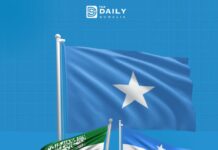By Hawo Mohamud – Educationist & Political Commentator
Introduction: A Nation Trapped in Cycles
Somalia once again stands at a dangerous political crossroads. The government and opposition are locked in open confrontation, while the opposition itself is splintered into rival camps. At the heart of this crisis lies not only mistrust between political actors but also a deeper structural failure: the absence of a finalized Constitution and a credible electoral model.
For more than three decades, Somalia has been trapped in cycles of improvisation. Constitutions remain provisional, elections remain disputed, and federalism remains undefined. Instead of providing stability, these unfinished frameworks have been weaponized as instruments of political warfare. Each side interprets the Constitution to serve its own interests, while the electoral model—the very mechanism meant to distribute power fairly—remains vague and manipulable.
The result is paralysis. Federal institutions and Federal Member States compete for legitimacy instead of working together to govern. Citizens are told to wait for “consensus,” yet consensus never arrives. Leaders waste years negotiating rules while insecurity spreads, the economy stagnates, and ordinary people lose faith in the state.
Hard Truths Beneath the Politics
Somalia’s crisis is not only about unfinished rules; it is about a state that fails to deliver on even the most basic obligations of governance. Evidence from the World Bank’s Toward Building Somalia’s Social Contract (2023) lays bare the reality:
- The weakest revenue base in the world: Domestic revenues stand at only 2.5% of GDP, the lowest globally. Nearly half of the federal budget still depends on aid.
- Unequal service delivery: Around 72–73% of citizens say education and health are improving at local or state levels, yet the federal government remains distant. Most still rely on private or informal providers.
- Tax morale vs. state failure: An impressive 91% of registered businesses comply with federal taxation, showing public willingness to support the state. Yet revenues rarely translate into visible services.
- Fragile federalism: Fiscal transfers from the Federal Government to Federal Member States grew from $9.4 million in 2016 to $111 million in 2022. Progress, but far below what is needed for a functional federal system.
These realities expose a stark contradiction: Somalis are ready to contribute, but their leaders have failed to build the political courage to translate those contributions into functioning governance. This “legitimacy gap” explains why political deadlock persists and why every election turns into a crisis.
What Must Be Done
This is not a matter of ordinary political disagreement. Disagreement is natural in a democracy. Somalia’s problem is the absence of binding mechanisms to resolve disputes. With no trusted Constitution to anchor political order and no predictable electoral model to guide competition, every election becomes a national crisis, every mandate extension a battle, and every dialogue a zero-sum game.
The political class must face a truth it has avoided for too long: Somalia cannot build a functioning state on unfinished, disputed, and provisional rules. The time for tactical maneuvering has passed. What is urgently required are three decisive steps:
- Finalize the Constitution—not through endless technical committees but through a binding political agreement endorsed by the public.
- Adopt a clear, permanent electoral model—whether direct elections, indirect clan-based formulas, or a hybrid, it must be codified and predictable.
- Open dialogue beyond elites—reconciliation cannot remain hostage to powerbrokers. Civil society, youth, and women must have a real seat at the table.
Conclusion: A Choice That Cannot Be Delayed
Without decisive action, Somalia will remain governed by uncertainty, where every administration suffers a permanent legitimacy crisis. Tragically, it is the ordinary Somali—enduring poverty, displacement, and insecurity—who pays the price for elite paralysis.
Somalia does not lack talent, resources, or resilience. What it lacks is political courage. The choice is stark: Somalia can either complete its unfinished state-building project or remain trapped in an endless loop of disputed mandates and broken promises. History will not be kind to leaders who fail to provide clarity and stability when the nation needs it most.




